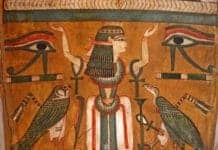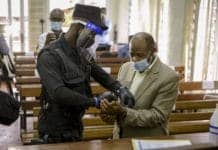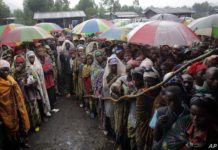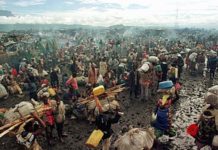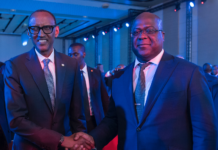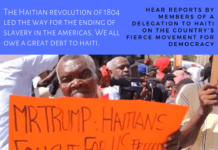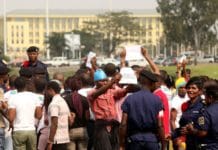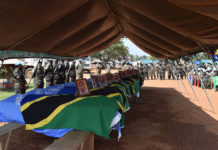Men and women of the Congo,

For this independence of the Congo, even as it is celebrated today with Belgium, a friendly country with whom we deal as equal to equal, no Congolese worthy of the name will ever be able to forget that is was by fighting that it has been won [applause], a day-to-day fight, an ardent and idealistic fight, a fight in which we were spared neither privation nor suffering, and for which we gave our strength and our blood.
We are proud of this struggle, of tears, of fire, and of blood, to the depths of our being, for it was a noble and just struggle, and indispensable to put an end to the humiliating slavery which was imposed upon us by force.
This was our fate for 80 years of a colonial regime; our wounds are too fresh and too painful still for us to drive them from our memory. We have known harassing work, exacted in exchange for salaries which did not permit us to eat enough to drive away hunger, or to clothe ourselves, or to house ourselves decently, or to raise our children as creatures dear to us.
We have known ironies, insults, blows that we endured morning, noon and evening, because we are Negroes. Who will forget that to a Black one said “tu”, certainly not as to a friend, but because the more honorable “vous” was reserved for whites alone?
We have seen our lands seized in the name of allegedly legal laws, which in fact recognized only that might is right. We have seen that the law was not the same for a white and for a Black – accommodating for the first, cruel and inhuman for the other.
We have witnessed atrocious sufferings of those condemned for their political opinions or religious beliefs, exiled in their own country, their fate truly worse than death itself.
We have seen that in the towns there were magnificent houses for the whites and crumbling shanties for the Blacks; that a Black was not admitted in the motion-picture houses, in the restaurants, in the stores of the Europeans; that a Black traveled in the holds, at the feet of the whites in their luxury cabins.
Who will ever forget the massacres where so many of our brothers perished, the cells into which those who refused to submit to a regime of oppression and exploitation were thrown [applause]?
All that, my brothers, we have endured. But we, whom the vote of your elected representatives have given the right to direct our dear country, we who have suffered in our body and in our heart from colonial oppression, we tell you very loud, all that is henceforth ended.
The Republic of the Congo has been proclaimed, and our country is now in the hands of its own children. Together, my brothers, my sisters, we are going to begin a new struggle, a sublime struggle, which will lead our country to peace, prosperity and greatness.
Together, we are going to establish social justice and make sure everyone has just remuneration for his labor [applause].

We are going to keep watch over the lands of our country so that they truly profit her children. We are going to restore ancient laws and make new ones which will be just and noble.
We are going to put an end to suppression of free thought and see to it that all our citizens enjoy to the full the fundamental liberties foreseen in the Declaration of the Rights of Man [applause].
We are going to do away with all discrimination of every variety and assure for each and all the position to which human dignity, work and dedication entitles him.
We are going to rule not by the peace of guns and bayonets but by a peace of the heart and the will [applause].
And for all that, dear fellow countrymen, be sure that we will count not only on our enormous strength and immense riches but on the assistance of numerous foreign countries whose collaboration we will accept if it is offered freely and with no attempt to impose on us an alien culture of no matter what nature [applause].
In this domain, Belgium, at last accepting the flow of history, has not tried to oppose our independence and is ready to give us their aid and their friendship, and a treaty has just been signed between our two countries, equal and independent. On our side, while we stay vigilant, we shall respect our obligations, given freely.
Thus, in the interior and the exterior, the new Congo, our dear Republic that my government will create, will be a rich, free and prosperous country. But so that we will reach this aim without delay, I ask all of you, legislators and citizens, to help me with all your strength.
I ask all of you to forget your tribal quarrels. They exhaust us. They risk making us despised abroad.
I ask the parliamentary minority to help my government through a constructive opposition and to limit themselves strictly to legal and democratic channels.
I ask all of you not to shrink before any sacrifice in order to achieve the success of our huge undertaking.
In conclusion, I ask you unconditionally to respect the life and the property of your fellow citizens and of foreigners living in our country. If the conduct of these foreigners leaves something to be desired, our justice will be prompt in expelling them from the territory of the republic; if, on the contrary, their conduct is good, they must be left in peace, for they also are working for our country’s prosperity.
The Congo’s independence marks a decisive step towards the liberation of the entire African continent [applause].
Sire, excellencies, mesdames, messieurs, my dear fellow countrymen, my brothers of race, my brothers of struggle – this is what I wanted to tell you in the name of the government on this magnificent day of our complete independence.
Our government – strong, national, popular – will be the health of our country.
I call on all Congolese citizens – men, women and children – to set themselves resolutely to the task of creating a prosperous national economy which will assure our economic independence.
Glory to the fighters for national liberation! Long live independence and African unity! Long live the independent and sovereign Congo! [applause, long and loud]
Patrice Lumumba

Congo is the wealthiest country in natural resources in Africa and perhaps the world; its farmland could feed Africa and the world. Lumumba saw in his country and its massive wealth a huge potential for greatness. He foresaw the population of Congo working together to build a great country. He was proud of Africa and proud to African.
In a letter to his wife before his death, Patrice Lumumba wrote: “No brutality, mistreatment or torture has ever forced me to ask for grace … I prefer to die with my head high, my faith steadfast and my confidence profound in the destiny of my country.”
After his assassination, Patrice Lumumba was hailed as a hero. He is remembered as a passionate believer in the power of African nations to free themselves and shape their own destinies. Building on his legacy today is the vital organization Friends of the Congo; learn more at www.friendsofthecongo.org.
Malcolm X on Lumumba
“Lumumba [is] the greatest Black man who ever walked the African continent. He didn’t fear anybody. He had those people so scared they had to kill him. They couldn’t buy him, they couldn’t frighten him, they couldn’t reach him. Why, he told the king of Belgium, ‘Man, you may have let us free, you may have given us our independence, but we can never forget these scars.’ The greatest speech — you should take that speech and tack it up over your door. This is what Lumumba said: ‘You aren’t giving us anything. Why, can you take back these scars that you put on our bodies? Can you give us back the limbs that you cut off while you were here?’” – Malcolm X at a rally in the Audubon Ballroom June 28, 1964
“The basic cause of most of the trouble in the Congo right now is the intervention of outsiders — the fighting that is going on over the mineral wealth of the Congo and over the strategic position that the Congo represents on the African continent. And in order to justify it, they are doing it at the expense of the Congolese, by trying to make it appear that the people are savages. And I think, as one of the gentlemen mentioned earlier, if there are savages in the Congo, then there are worse savages in Mississippi, Alabama and New York City, and probably some in Washington, D.C., too.” – Malcolm X on radio station WMCA Nov. 28, 1964

 Store
Store



